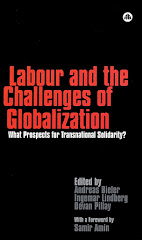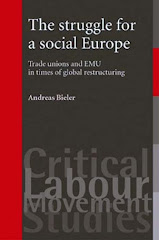Greece is the country, which suffers one of the worst neo-liberal attacks in Europe (see The Imposition of Austerity). And yet, Greek workers have not given up. They continue to challenge and resist capitalist restructuring. In this guest post, Giorgos Bithymitris from the Panteion University of Social and Political Sciences in Athens discusses how steel workers at Hellenic Halyvourgia have not only been able to sustain a long strike, but also succeeded in providing encouragement for Greek workers more generally.
Wednesday 25 July 2012
Thursday 19 July 2012
Corruption in the banking industry – the problem of a few ‘bad apples’?
The working
practices of banks have come under close scrutiny recently. After Barclays'
involvement in the LIBOR-rigging scandal (BBC, 17 July 2012), news
broke on 17 July that HSBC, another prominent player in the global financial
markets, provided ‘a conduit for "drug kingpins and rogue nations",
according to a US Senate committee investigating money laundering claims at the
bank’ (BBC News, 17 July
2012). This adds further to the general pressure on banks widely regarded
as responsible for the global financial market crisis. In response, calls are
issued to tighten the regulation of financial markets. In this post, I argue
that scandals of this type are not the occasional result of criminal or
reckless behaviour by individuals. Rather, they are a logical consequence of
the systemic pressures within the capitalist mode of production, in which
companies constantly have to achieve larger profits than their competitors in
order to stay in business.
Monday 9 July 2012
Norwegian exceptionalism?
In 2005, a coalition government
led by the Norwegian Labour Party took office. Four years later, it retained power
in the 2009 elections. Welfare spending continues to be high, an expansive
public sector has been maintained and trade unions continue to enjoy a strong
role in economic and social policy-making. In many respects, Norway has
successfully resisted the general direction of neo-liberal restructuring,
public sector cuts and undermining of the welfare state. In this blog post, I
will discuss how we can explain this apparent Norwegian exceptionalism.
 |
| Photo by xitus |
It is often argued that oil
wealth would explain Norwegian exceptionalism. And indeed, in contrast to other
developed countries, Norway has not had to incur a budget deficit in order to
stimulate the economy during the current global financial crisis. It could rely
on its oil wealth fund. However, as a leading trade unionist remarked to me in
an interview, the crucial institutions of the Norwegian political economy, the
gains made by trade unions, were all achieved before the oil wealth appeared on the agenda in the 1970s. Hence,
the key explanation needs to be looked for elsewhere.
Two main reasons can be identified for Norwegian
exceptionalism. First, in contrast to other small European countries, the
Norwegian production structure is comparatively little transnationalised.
Capital in Norway is characterized by the predominance of small and
medium-sized companies and, as a result, is comparatively weak (see Bieler
2012: 234-5). In contrast to countries such as Sweden, dominated by large
transnational corporations, capital cannot dictate labour how to organize the
domestic political economy (see also Globalisation
and the erosion of the Nordic model).
Moreover, the Norwegian Union of
Municipal and General Employees (Fagforbundet) realised that the balance of
power between capital and labour, on which the class compromise around the
welfare state had been built, had changed in Norway. In response, it
established the broad-based Norwegian Campaign for the Welfare
State, which consisted of trade unions in the public and private sector
as well as a whole range of other social movements and NGOs, including the
Welfare Alliance, the Norwegian Farmers’ and Smallholders’ Union, several
feminist groups and a students’ organisation. The Campaign for the Welfare State fulfilled two crucial functions.
First, through educational initiatives it mobilised support for the welfare
state and against neo-liberal restructuring, and here especially the idea that
the introduction of competition would deliver efficiency gains in the public
sector. Second, it broadened the social basis of resistance against public
sector restructuring and, thus, established a balance of power with capital.
Overall, both the politically
more independent position of the trade unions vis-à-vis the Labour Party and
the broad-based Campaign for the Welfare
State put strong pressure on the Labour Party. As a result of these campaigns,
the Labour Party, as an exception in Europe, moved to the left prior to the
2005 elections and has actually delivered policies in the interests of workers
and wider society. Nevertheless, employers and centre-right parties continue to
put pressure on the Norwegian government towards budget cuts and public sector
restructuring. The Labour Party itself may be tempted to move again towards
this policy course. Successes as achieved in 2005 constantly need to be
re-affirmed and trade union agency for the welfare state will remain crucial.
This blog post is based on the article
Bieler,
Andreas (2012) ‘Small
Nordic Countries and Globalisation: Analysing Norwegian exceptionalism’, Competition and Change, Vol.16/3: 224-42.
Prof. Andreas Bieler
Professor of
Political Economy
University of
Nottingham/UK
Personal website: http://www.nottingham.ac.uk/~ldzab
9 July 2012
Thursday 5 July 2012
Karl Marx, Class Struggles in France and historical materialist methodology!
Karl Marx did not only involve himself in
abstract conceptual work on how to understand the capitalist social relations
of production. He was also an engaged analyst of class struggles at his time.
This included three separate writings on developments in France: The
Class Struggles in France, 1848-1850 (1850); The
Eighteenth Brumaire of Louis Bonaparte (1852); and The
Civil War in France (1871). In this post, I will discuss key aspects of
Marx’s historical materialist approach in relation to The
Class Struggles in France, 1848-50 and conclude with some ideas of what
this method implies for efforts today to understand the global political
economy as well as the possibilities for revolutionary change.
Monday 2 July 2012
Workers of the World Unite?
I have just published the article ‘“Workers of the world, unite?” Globalisation and the quest for transnational solidarity’ in the journal Globalizations. In this article, I discuss the structural setting of labour agency at this point in time and evaluate two broad responses by trade unions and social movements, the Decent Work, Decent Life initiative as well as the Labour and Globalisation Network.
Subscribe to:
Posts (Atom)













